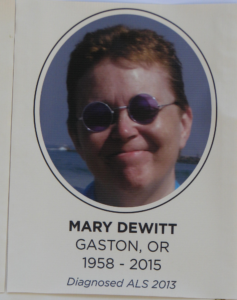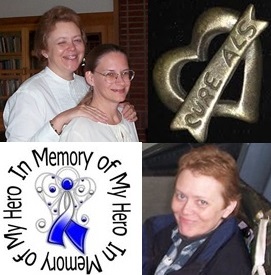September 6, 2016
There is no time table for grief.
That whole “grieving for a year after losing a spouse” idea is bullshit. Each person walks through it differently. It can punch you in the gut just as intensely a year after the loss – or two – as it does the day of. And you never know what will trigger it.
Two weeks after the death, the support dries up and floats away like cremains. The surviving spouse becomes one of the walking dead, trying to rediscover who they are, trying to create who they want to become, all the while grieving the years of togetherness that were just torn away. The sleepless nights go on and on. Learning to cook for one person. Learning to go to the grocery store without them. Buying a car without them, or even a new TV. Painting the house.
You try to find friends who understand, who aren’t afraid of your “mood swings”, friends who and will try to guide you gently back into the world of the living. Finally, one day, you laugh about something and then you pick up your phone to call or text your spouse and tell them about it, and it hits all over again.You send your child off for their first day of kindergarten, of high school, of college, and no one understands why you are curled up in a ball. Your doctor tells you to get a colonoscopy and you have no one to drive you so you start crying, and the doctor tells you “we need to talk about your emotional health”, aka “you should be over this by now, we need to talk about meds.” You go to a family reunion and your spouse won’t be in the picture this time.
Just because someone’s Facebook page makes it look like they are doing ok, it doesn’t mean they are. It means they are doing the best they can, but most of the time it feels like they will never be ok again. It means they have stopped posting how they feel because they hear “you should be over this by now” or “have you talked to a therapist?” or they post and its crickets.
Grief is a roller coaster. Sometimes you just glide along, and then there is a 60 degree plummet and your stomach is in your throat. The difference is the plummet isn’t over in 60 seconds, and it takes a lot longer for the climb on the other side.
What can you do to help your friends and loved ones who are grieving? Let them know you are thinking about them. Let them know they are loved. Let them know that you don’t understand how they feel (unless you really do), but you will listen with an open heart. Let them take their time. Don’t push them to work through things because it makes you uncomfortable. Keep an eye on them in case they really do need professional help, but don’t assume they do just because they are still grieving 6 months, 12 months, 2 years later.
We will always grieve the loss. That doesn’t mean we are unhealthy. It means we loved deeply. We won’t show you most of the time just how bad it can be. We don’t want to burden you with it, and we don’t want to be told how to handle our emotions.
Just love us.
 een 19 months since Mary crossed to the Summerlands. I promised her that when she was done fighting, I would fight for everyone else. This months’ posts have been one way I continue to do that.
een 19 months since Mary crossed to the Summerlands. I promised her that when she was done fighting, I would fight for everyone else. This months’ posts have been one way I continue to do that.

